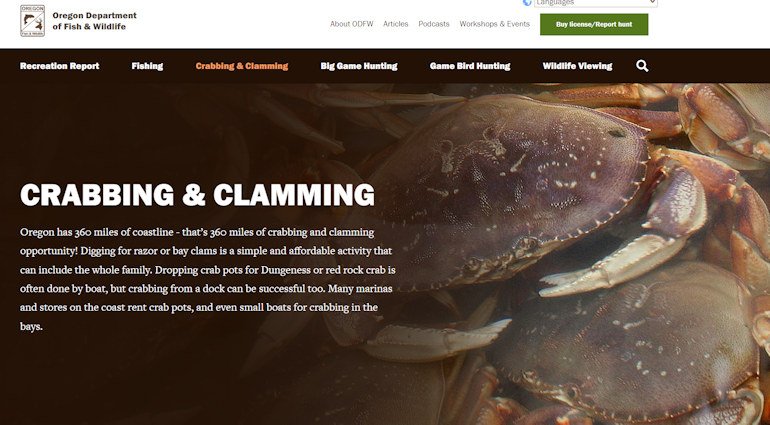At least 20 sickened by biotoxin from mussels harvested over weekend on north Oregon coast; officials say to throw them out

(Update: At least 20 sickened by mussels harvested this weekend)
PORTLAND, Ore. (KTVZ) — An outbreak of paralytic shellfish poisoning that sickened at least 20 people is prompting state health officials to urge those who harvested mussels from a now-closed stretch of Oregon’s coast since Saturday to discard the mollusks.
Officials at the Oregon Health Authority’s Public Health Division also recommend people who experience any symptoms of paralytic shellfish poisoning (PSP) – numbness of the mouth and lips, nausea, vomiting, diarrhea, weakness, and in severe cases, shortness of breath or irregular heartbeat – immediately contact a health care provider. They can also get advice by calling the Oregon Poison Center at 800-222-1222.
All 20 people who fell ill reported recreationally harvesting mussels Saturday or Sunday at Short Beach near Oceanside in Tillamook County, and Hug Point and near Seaside in Clatsop County. Some of the cases have been hospitalized, but no deaths have been reported.
Last Thursday, the Oregon Department of Fish and Wildlife and the Oregon Department of Agriculture closed a stretch of the Oregon coast to mussel harvesting from Seal Rock State Park north to Cape Lookout due to high levels of PSP. On Sunday, the mussel harvest closure was extended from Seal Rock State Park north to the Washington border.
“We have two messages: If you have any mussels gathered since Saturday from beaches within the area of coastline that ODFW and ODA closed to harvesting – that you are preparing for a meal or keeping in the freezer for a later time – throw them out now and do not feed them to pets,” said Emilio DeBess, epidemiologist at the Oregon Public Health Division’s Acute and Communicable Disease Prevention Section. “And if you have eaten any of these mussels and are feeling ill, see a doctor right away.”
DeBess added that the recommendations only apply to mussels harvested by private individuals, not those harvested commercially and purchased in a grocery store or at a restaurant.
PSP is a foodborne illness caused by saxitoxins produced by marine algae and caused by eating shellfish contaminated with the naturally occurring biotoxin, including scallops, mussels, clams, oysters and cockles, as well as some fish and crabs, according to the Centers for Disease Control and Prevention (CDC). There is no antidote for PSP – treatment involves supportive care and, if necessary, respiratory support.
PSP is the most common and most severe form of shellfish poisoning. It occurs worldwide but is most common in temperate waters off the Atlantic and Pacific coasts of North America.
Signs of illness usually appear 30 to 60 minutes after a person eats toxic shellfish and include numbness and tingling of the face, lips, tongue, arms and legs. Patients also might have diarrhea and vomiting, headache, and nausea. Severe cases are associated with ingestion of large doses of toxin and clinical features such as poor muscle control, clumsiness or slurred speech, difficulty swallowing, loose or floppy limbs, mental status changes, and respiratory failure.
PSP can be deadly, especially for children. Appropriate medical care can lessen the risk of death.
Shellfish poisoning can be prevented by avoiding potentially contaminated shellfish, which is particularly important in areas during or shortly after algal blooms. Marine shellfish toxins cannot be destroyed by cooking or freezing, and shellfish that carry them do not necessarily taste different from uncontaminated shellfish.
Avoid harvest and consumption of seafood from beaches with biotoxin closures.
Treatment for paralytic shellfish poisoning is symptomatic and supportive. Severe cases of paralytic shellfish poisoning might require mechanical ventilation.
For additional information:
- Centers for Disease Control and Prevention: https://wwwnc.cdc.gov/travel/yellowbook/2024/environmental-hazards-risks/food-poisoning-from-marine-toxins
- Oregon Department of Agriculture Recreational Shellfish Biotoxin Closure: https://www.oregon.gov/ODA/programs/FoodSafety/Shellfish/Pages/ShellfishClosures.aspx
- Oregon Department of Fish and Wildlife Shellfish and Biotoxins: https://myodfw.com/articles/shellfish-and-biotoxins#:~:text=Paralytic%20Shellfish%20Poisoning%20(PSP)%3A&text=People%20who%20eat%20shellfish%20that,occur%20within%20hours%20of%20consumption.
- Oregon Health Authority Fish and Shellfish Consumption Resources: https://www.oregon.gov/oha/ph/healthyenvironments/recreation/fishconsumption/pages/seafood-shellfish.aspx
Mussel harvesting is now closed from the Washington border to Seal Rock State Park. It remains open from Seal Rock State Park to the California border.
Razor clam harvesting is open from the Washington border to Cape Blanco. Razor clam harvesting is closed from Cape Blanco to the California border.
Crab and bay clam harvesting are open along the entire Oregon coast.
ODFW says the mussel closure is not related to the oil event currently happening along the northern Oregon and southern Washington coasts.
PSP is a natural marine biotoxin produced by some species of microscopic algae. ODA’s testing showed the PSP level in mussels was rising in the last few weeks, and levels are now beyond the safety threshold.
The Oregon Department of Agriculture will continue to test for shellfish toxins twice per month, as tides and weather permit. Reopening an area closed for biotoxins requires two consecutive tests with results below the closure limit. Contact ODFW for recreational license requirements, permits, rules and limits.
For more information, call Oregon Department of Agriculture's (ODA) shellfish biotoxin safety hotline at (800) 448-2474, the Food Safety Division at (503) 986-4720, or visit the ODA recreational shellfish biotoxin closures webpage.